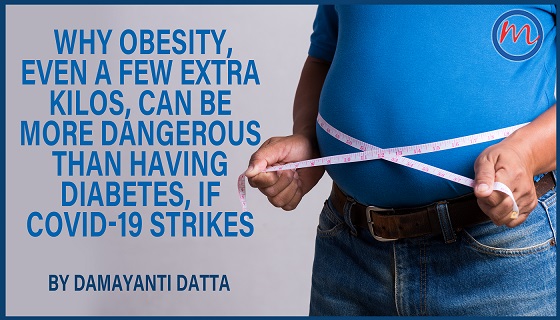WHY OBESITY, EVEN A FEW EXTRA KILOS, CAN BE MORE DANGEROUS THAN HAVING DIABETES, IF COVID-19 STRIKES
In a pandemic characterized by extreme uncertainty, the world of science is waking up to new puzzles and finding new solutions every day. One such troublesome issue is obesity and its relation with coronavirus. Ever since the pandemic began, it has come to light that people with diabetes, heart disease and hypertension suffer the most. The report on obesity has been inconclusive—so long, that is.
Now, that link has come into sharper focus. The US Centers for Disease Control and Prevention (CDC) has updated its guidelines on who is most at risk for severe illness from coronavirus infection. The CDC has posted a new warning on its website on Oct 6: “Revisions were made on October 6, 2020, to reflect recent data supporting increased risk of severe illness from the virus that causes COVID-19… who have obesity, who have overweight…”
THE NEW ALERT FROM CDC
As far back as April, the CDC had advised that older adults and people of any age with serious underlying medical conditions, including obesity with a higher BMI, might be at higher risk for complications and severe illness from Covid-19. Of the 10 health risk factors on the agency’s list included cancer, chronic kidney disease, COPD (chronic obstructive pulmonary disease), sickle cell disease, smoking, a weakened immune system from solid organ transplantation, obesity and severe obesity, type 2 diabetes and serious heart conditions.
The list now zeroes in on people who are just overweight, not even obese, as being at higher risk. What exactly does “overweight” mean? A healthy weight is supposed to be a body mass index (BMI) of 24 or less (BMI is weight in kilograms divided by the square of height in meters). The CDC clarifies: “Having obesity, defined as a body mass index (BMI) between 30 kg/m2 and <40 kg/m2 or severe obesity (BMI of 40 kg/m2 or above), increases your risk of severe illness from COVID-19…Having overweight, defined as a BMI > 25 kg/m2 but less than 30 kg/m2 might increase your risk of severe illness from COVID-19.”
EARLY DATA FROM CHINA
The results do not come as a surprise to researchers from the All India Institute of Medical Sciences, Delhi, who have been analysing online database on Covid-19. “We observed a changing dynamic in the reporting from the time of initial pandemic in China to currently reported research,” writes Dr Rakhee Yadav, lead author of the paper published in Diabetes & Metabolic Syndrome (online) in Jul 2020. “While initially body mass index (BMI) did not find a mention in the data, it is now clearly emerging that obesity is one of the profound risk factors for complications of Covid-19,” the authors add.
Despite a paucity of systematic information on BMI in early studies, they found piecemeal references to obesity and coronavirus from hospitals in China between January 20 to February 15: for instance, at a Wuhan hospital, over 88 percent non-survivors from Covid-19 had BMI over 25 kg/m2; in another study from Wenzhou, China, there was a six-fold increased risk of severe Covid-19 among patients with obesity and fatty liver disease. By April, a close survey of data across the world revealed the emergence of obesity as one of the major risk factors for Covid-19 complications. By June, they found a number of studies from US, Brazil, UK, Italy, Spain and France reporting the same.
Dr. V. Mohan, Chairman, Dr. Mohan’s Diabetes Specialities Centre add “We in India (and South Asia) are prone to develop cardiometabolic risk even at lower BMI levels. Hence we have to be even more concerned about our weight. The good news is that by increasing physical activity (even in the absence of weight loss) our immunity can improve and it can help protective effects”.
WHAT SEVERE OBESITY DOES
A study of 6,916 Covid-19 patients, published in the Annals of Internal Medicine in early August, showed how “severe obesity” presents a greater risk of death from Covid-19, than diabetes or hypertension. Compared with those at normal BMI, the risk of death more than doubled for patients with a BMI of 40 to 44 kg/m2 and nearly doubled again for those with a BMI of 45 kg/m2. The risk was most striking among those aged 60 years or younger and in men.
In an accompanying editorial piece, cardiologist David A. Kass of John Hopkins University writes that Covid-19 makes it hard to breathe, and excess fat only makes it worse. Fat deposited in skeletal muscles compromises muscle efficiency and performance, Kass explains: “It requires more muscle force to displace the diaphragm downward when a substantial fat mass lies below it. Abdominal obesity also makes it more difficult to breathe in a prone position that is favoured to improve ventilation in patients with Covid-19.”
THE BIOLOGY OF OBESITY & COVID
International teams of scientists are fitting together the puzzle pieces, capturing thousands of patient records, joining the dots of massive meta-analyses and making all possible connections by pooling data from peer-reviewed papers. New evidences are emerging and challenging the old. Here are the big takeaways:
- The biology of obesity includes impaired immunity, chronic inflammation, and blood that’s prone to clot, all of which can worsen Covid-19.
- Fat cells fuel mechanisms that attract the SARS-CoV-2 virus. For instance, the ACE-2 protein (which the virus uses to enter a cell) are found aplenty in fat tissue, more than the lungs. Hence, fat serves as an easy refuge and replication site for the virus.
- The blood of people with obesity has an increased tendency to clot and clog the small vessels of the lungs with clots. This is an especially grave risk during severe infections, like Covid-19.
- The Covid viruses injure the endothelial cells that line blood vessels. The endothelium also regulates clot formation and the virus possibly damages the signalling pathways, activating the coagulation system. Add obesity to the mix, and the clotting risk shoots up. In Covid-19 patients with obesity, doctors report extremely sticky blood.
- Immunity also gets weakened in people with obesity. Partly because, fat cells infiltrate the organs where immune cells are produced and stored—the spleen, bone marrow, and the thymus. As we gain fat, we lose immune cells. The immune system gets less effective in either protecting the body from pathogens or responding to a vaccine.
- The biggest risk is that key immune cells, called T-cells, don’t function well in the obese state. T-cells are killer cells in the body’s defense system. They directly kill infected host cells, activate other immune cells and regulate the immune response.
- In people with obesity, T-cells make fewer molecules that destroy virus-infected cells. The “memory” T-cells, that are left behind after an infection (these cells remember the rogue invaders so that they can be neutralized during future attacks), are smaller than usual. Scientists believe this might make coronavirus vaccines less effective in obese people.
- People with obesity also suffer from chronic, low-grade inflammation. Fat cells secrete several inflammation-triggering chemical messengers (cytokines). The effect may compound the runaway cytokine activity that characterises severe Covid-19.
TAKE EXTRA CARE
If you are overweight or obese, take extra care. Wear your mask, wash your hands, avoid large gatherings and try losing some weight. Even a little weight loss can improve your metabolic health and reduce your chance of developing severe Covid-19, if you get the infection.




